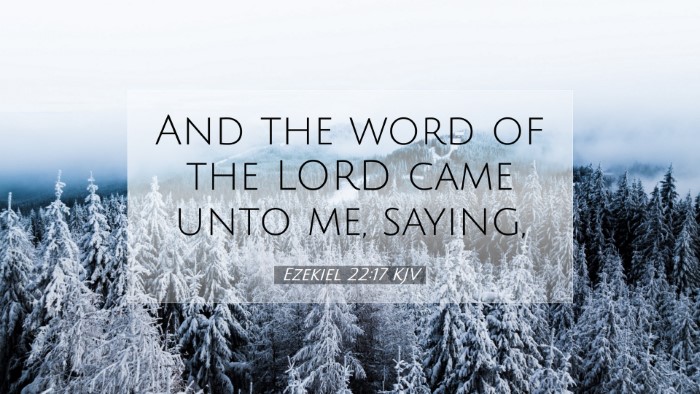Ezekiel 22:17 - Summary of Commentary
Verse Text: "And the word of the LORD came unto me, saying,
Introduction
The verse in Ezekiel 22:17 serves as a critical juncture in the prophetic message delivered to Israel during a time of great moral and spiritual decline. The insights provided by esteemed commentators such as Matthew Henry, Albert Barnes, and Adam Clarke shed profound light on the meaning and ramifications of this passage. This commentary seeks to explore the implications of this verse in light of the socio-religious context of ancient Israel, while drawing connections to its relevance for contemporary readers, particularly pastors, students, theologians, and Bible scholars.
Contextual Examination
Ezekiel, a priest and prophet, ministered during the Babylonian captivity and addressed the failures of the people of Judah. Ezekiel 22 reflects a series of denunciations against Jerusalem’s leaders and populace for the rampant idolatry, injustice, and moral decay that had permeated society. The call of God, as noted in this verse, underscores the necessity of divine judgment and the purification of His people.
Insights from Matthew Henry
Matthew Henry articulates the divine concern over the state of Israel as a nation deteriorating due to moral and spiritual corruption. He observes that God was displeased not merely because of the acts of sin but due to the collective failure of the people to recognize their wrongdoings. Henry notes that God's acknowledgement of this corruption reflects His eternal nature of justice and is indicative of the need for divine intervention.
- Divine Awareness: Henry emphasizes that God is intimately aware of the actions and conditions of His people, calling them to repentance.
- Collective Responsibility: He highlights the importance of communal accountability in the face of sin, warning leaders and laypersons alike of the dire consequences that follow.
Insights from Albert Barnes
Albert Barnes elaborates on the significance of the metaphor of dross—impurities arising during times of judgment. He highlights that God's assessment of His people as “dross” signifies their complete moral failure and loss of identity. Barnes’ commentary stresses that God's intention in revealing their condition is not to leave them hopeless but to punish in order to purify.
- Moral Purification: Barnes interprets dross as representing that which is worthless, emphasizing God’s desire for His people to be refined and restored.
- Prophetic Role: He also discusses Ezekiel’s role as a prophet, relaying messages of both judgment and hope—God’s ultimate intention is restoration.
Insights from Adam Clarke
Adam Clarke provides a detailed linguistic and theological breakdown of the Hebrew terms used in this passage. He underscores the gravity of divine judgment and the seriousness with which God views sin among His chosen people. Clarke points out that the Lord's address to Ezekiel is indicative of a profound need for the prophet to witness and understand the socio-spiritual landscape of his nation.
- Judgment as Clarion Call: Clarke posits that God’s words are both a warning and a clarion call to His people, beckoning them towards reform and renewal.
- Covenantal Faithfulness: He notes that this verse encapsulates the essence of God’s covenant—if the people choose rebellion, they must face the inevitable consequences.
Theological Implications
This verse articulates the relational dynamics between God and His people. The call for examination and repentance is not merely a call to individual piety but also speaks to community integrity and collective faithfulness to God. The themes of judgment and purification resonate throughout Scripture, making this passage pertinent for understanding God’s moral order and redemptive plans.
- Collective Judgment: The notion of collective judgment serves as a salient reminder for contemporary believers about their responsibility within the community of faith.
- God’s Character: This text offers deep insights into God’s character—His holiness demands accountability, yet His mercy seeks restoration, inviting hearts back to Him.
Modern Application
For pastors and church leaders today, Ezekiel 22:17 challenges collective church life. There is a call to examine the state of the church amidst surrounding moral complexities. Similar to Ezekiel's time, contemporary society often roots itself in secularism and idolatry, necessitating that leaders call their congregations to return to biblical truths.
- Call to Repentance: Pastors are reminded of their prophetic voices to call congregations back to righteousness.
- Community Health: The health of the community mirrors the individual choices made within it, urging holistic engagement in spiritual matters for renewal and reform.
Conclusion
Ezekiel 22:17 serves as a poignant reminder of the consequences of collective sin and the hope of restoration that is available through God’s loving yet just character. The insights from Matthew Henry, Albert Barnes, and Adam Clarke emphasize the need for both personal and corporate accountability, the divine calling towards moral purity, and the restorative nature of God’s relationship with His people. For all who seek to understand Scripture—pastors, students, theologians, and scholars—this verse invites contemplation on the urgent need for spiritual awakening and the rich truths found in God’s covenantal promises.


